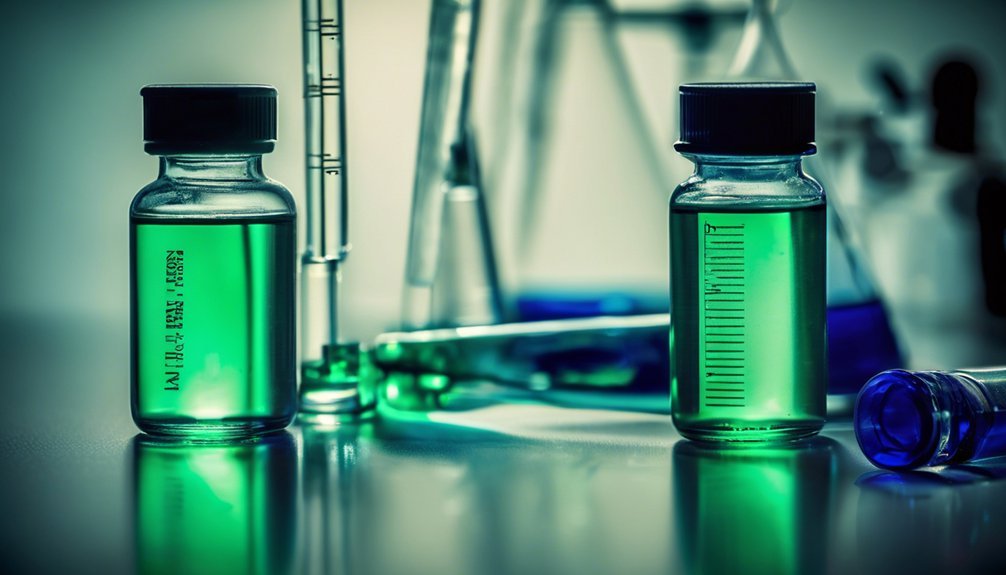When it comes to combating cancer naturally through lifestyle changes, you might be surprised to find out the significant impact simple adjustments can have on your overall health. By making conscious choices in your daily routine, you can effectively support your body's defense mechanisms against cancer. From the foods you eat to the activities you engage in, every decision plays a crucial role in maintaining a healthy lifestyle that can potentially reduce your risk of developing cancer. But how exactly do these lifestyle changes work to combat cancer? Let's explore the science behind these strategies and uncover their potential benefits for your health and well-being.
Key Takeaways
- Nutrient-rich diet with antioxidants fights cancer naturally.
- Regular physical activity boosts immune function and reduces inflammation.
- Stress reduction techniques like meditation and yoga enhance well-being.
- Quality sleep habits regulate internal clock and promote better health.
- Avoid harmful substances like tobacco smoke to lower cancer risk.
Importance of Healthy Diet
Regularly consuming a nutrient-rich diet plays a crucial role in combating cancer naturally. Nutrient-rich foods are essential for overall health and can significantly contribute to cancer prevention.
Fruits and vegetables, such as berries, leafy greens, and cruciferous vegetables, are packed with antioxidants, vitamins, and minerals that help protect cells from damage that can lead to cancer.
Whole grains like brown rice, quinoa, and oats provide fiber, which aids in digestion and may reduce the risk of certain types of cancer. Including sources of lean protein, like fish, poultry, and legumes, can help maintain healthy cells and tissues.
Additionally, foods rich in omega-3 fatty acids, such as salmon, walnuts, and flaxseeds, have anti-inflammatory properties that may help lower the risk of cancer.
Limiting processed foods, sugary drinks, and red and processed meats is also crucial in cancer prevention. By focusing on a diet abundant in nutrient-rich foods, you can proactively support your body in the fight against cancer.
Regular Physical Activity
Engaging in regular physical activity is a vital component in the realm of cancer prevention and overall health. Regular exercise offers numerous benefits for physical wellness, impacting your body on a cellular level. Here are four compelling reasons why incorporating physical activity into your routine is crucial:
- Boosted Immune Function: Exercise has been shown to enhance immune system efficiency, potentially aiding in the body's ability to combat cancer cells.
- Reduced Inflammation: Physical activity can help decrease chronic inflammation, which is linked to the development of various types of cancer.
- Improved Circulation: Regular exercise promotes better blood flow, ensuring that nutrients and oxygen reach all parts of the body, supporting overall health and potentially reducing cancer risk.
- Weight Management: Maintaining a healthy weight through exercise can lower the risk of developing certain cancers associated with obesity.
Incorporating regular physical activity into your lifestyle can contribute significantly to reducing cancer risk and promoting overall well-being.
Stress Reduction Techniques

To effectively manage stress and potentially reduce the risk of cancer development, implementing stress reduction techniques is paramount. Relaxation techniques play a crucial role in promoting mental wellness and overall health. Engaging in activities such as deep breathing exercises, progressive muscle relaxation, meditation, or yoga can help lower stress levels and enhance emotional well-being.
Deep breathing exercises, for instance, focus on slow, deep breaths to calm the mind and body, reducing stress hormones in the process.
Progressive muscle relaxation involves tensing and then relaxing different muscle groups to release physical tension and promote a sense of calm.
Meditation and yoga are practices that encourage mindfulness, helping individuals stay present and cultivate a state of inner peace.
Quality Sleep Habits
Developing and maintaining quality sleep habits is crucial for overall health and well-being. Proper sleep hygiene and relaxation techniques can positively impact your circadian rhythm and melatonin production, essential factors in combating cancer naturally. Here are four key aspects to consider:
- Consistent Sleep Schedule: Go to bed and wake up at the same time every day, even on weekends, to regulate your body's internal clock.
- Create a Relaxing Bedtime Routine: Wind down before bed with calming activities like reading or taking a warm bath to signal to your body that it's time to sleep.
- Optimize Your Sleep Environment: Ensure your bedroom is dark, quiet, and cool to promote better sleep quality.
- Limit Screen Time: Avoid electronic devices before bed as the blue light emitted can disrupt your circadian rhythm and melatonin production.
Avoiding Harmful Substances

While navigating your journey towards combating cancer naturally, it's imperative to prioritize avoiding harmful substances that can potentially increase your risk of cancer development or hinder your body's ability to fight the disease.
Toxic exposure to substances like tobacco smoke, asbestos, pesticides, and certain chemicals found in everyday products can promote cancer growth and interfere with your body's normal functions.
To combat this, focus on chemical detoxification by reducing your exposure to these harmful substances. Opt for organic foods to minimize pesticide intake, avoid smoking and secondhand smoke, and choose natural cleaning and personal care products to limit chemical exposure.
Additionally, be mindful of environmental pollutants and seek ways to minimize your contact with them. By actively working to reduce toxic exposure and supporting your body's natural detoxification processes, you can create a healthier environment within your body that's less conducive to cancer development.
Maintaining Healthy Weight
How does maintaining a healthy weight impact cancer prevention and overall well-being? Weight management plays a crucial role in reducing the risk of cancer and promoting overall health. Here are four key ways in which maintaining a healthy weight through proper weight management and healthy eating habits can benefit you:
- Decreased Inflammation: Excess weight can lead to chronic inflammation in the body, which is a known risk factor for various types of cancer.
- Improved Immune Function: Maintaining a healthy weight supports a robust immune system, helping your body fight off cancer cells more effectively.
- Balanced Hormone Levels: Being at a healthy weight helps regulate hormone levels, reducing the risk of hormone-related cancers.
- Enhanced Nutrient Absorption: Healthy eating habits associated with weight management ensure your body receives essential nutrients vital for cancer prevention and overall well-being.
Mindfulness and Meditation

Mindfulness and meditation have garnered increasing attention in the realm of cancer prevention and overall well-being. Meditation benefits individuals by reducing stress, anxiety, and depression, which are crucial factors in cancer development and progression.
Mindfulness practices involve being fully present in the moment, cultivating awareness of thoughts and emotions without judgment. Research suggests that incorporating mindfulness and meditation into your daily routine can positively impact your physical health by boosting immune function and reducing inflammation, both of which play essential roles in cancer prevention.
Studies have shown that mindfulness practices can enhance psychological well-being, improve sleep quality, and increase overall resilience to life's challenges. By incorporating meditation into your lifestyle, you may experience reduced cortisol levels, better emotional regulation, and improved coping mechanisms when faced with stressful situations.
Cultivating a regular mindfulness practice can contribute to a sense of inner peace and promote a positive outlook on life, which are essential components of overall well-being and cancer prevention.
Social Connections and Support
Social connections and support have been identified as significant factors in cancer prevention and management. Engaging in support groups and participating in community events can have a positive impact on your overall well-being during your cancer journey. Here are some ways social connections and support can benefit you:
- Emotional Well-being: Being part of a support group can help you feel understood and less isolated, reducing feelings of anxiety and depression.
- Information Sharing: Interacting with others who've similar experiences can provide valuable information about treatments, coping strategies, and healthcare resources.
- Sense of Belonging: Attending community events can foster a sense of belonging and purpose, boosting your mental and emotional resilience.
- Practical Assistance: Support groups may offer practical help such as transportation to appointments, meals, or assistance with daily tasks, easing your burden during treatment.
Sun Safety Practices

To maintain optimal health during your cancer journey, it is crucial to also pay attention to sun safety practices. Sun exposure can have damaging effects on your skin, especially during cancer treatment when your skin may be more sensitive. One essential sun safety practice is the regular application of sunscreen with a high SPF to protect your skin from harmful UV rays. Additionally, seeking shade, wearing protective clothing like hats and sunglasses, and avoiding peak sun hours can further reduce your UV exposure.
| Sun Safety Practices | Benefits | Recommendations |
|---|---|---|
| Sunscreen Application | Shields skin from UV damage | Apply generously every two hours or after swimming/sweating |
| UV Protection | Reduces risk of skin cancer | Seek shade between 10 am and 4 pm; wear wide-brimmed hats and UV-blocking sunglasses |
Importance of Hydration
Ensuring adequate hydration is paramount for maintaining optimal health, particularly during your cancer journey. Proper water intake and electrolyte balance are crucial elements in supporting your body through this challenging time. Here are some key points to consider:
- Water Intake: Aim to drink at least 8-10 cups of water daily to stay hydrated and support your body's natural detoxification processes.
- Electrolyte Balance: Include foods rich in electrolytes like potassium, magnesium, and calcium to help regulate fluid balance and support cellular function.
- Hydration Monitoring: Keep track of your water intake and adjust based on your activity level, climate, and overall health status.
- Hydration Sources: In addition to water, consider hydrating foods like fruits, vegetables, and herbal teas to supplement your fluid intake and provide additional nutrients.
Incorporating Superfoods

Incorporating superfoods into your diet can be a beneficial strategy in supporting your overall health, including during your cancer journey. Superfoods are nutrient-dense foods that are rich in vitamins, minerals, antioxidants, and other essential compounds that can help boost your immune system and combat inflammation. Some popular superfoods include berries, leafy greens, nuts, seeds, and fatty fish like salmon.
Superfood benefits extend beyond general health improvements. They can play a significant role in cancer prevention and management due to their anti-inflammatory and antioxidant properties. Incorporating superfoods into your meals can help reduce oxidative stress, promote healthy cell growth, and support your body in fighting off cancer cells.
To make the most of superfoods, consider trying out delicious superfood recipes. Smoothie bowls with acai and mixed berries, quinoa salads with kale and avocado, or chia seed pudding with almond milk are just a few examples of nutritious and tasty superfood dishes you can enjoy. By incorporating these nutrient-packed foods into your diet, you can take proactive steps in supporting your overall well-being during your cancer journey.
Balancing Hormones Naturally
Naturally balancing hormones is a crucial aspect of maintaining optimal health and well-being. Hormone regulation plays a significant role in various bodily functions, including metabolism, growth, and reproductive health. Here are four natural remedies that can help you balance your hormones effectively:
- Healthy Diet: Consuming a diet rich in fruits, vegetables, whole grains, and lean proteins can support hormone balance.
- Regular Exercise: Engaging in physical activity regularly can help regulate hormone levels and promote overall well-being.
- Adequate Sleep: Getting enough quality sleep is essential for hormone regulation, as lack of sleep can disrupt the balance of hormones like cortisol and insulin.
- Stress Management: Chronic stress can impact hormone levels negatively. Practicing relaxation techniques such as meditation, yoga, or deep breathing exercises can help manage stress and support hormone balance.
Frequently Asked Questions
Can Specific Foods or Drinks Cure Cancer?
Specific foods or drinks can't cure cancer. While some dietary supplements or herbal remedies may have potential health benefits, they aren't a standalone cure for cancer. It's essential to rely on scientifically proven medical treatments like chemotherapy, radiation, or surgery for cancer management.
Always consult with healthcare professionals before incorporating any dietary supplements or herbal remedies into your cancer treatment plan to ensure they don't interfere with prescribed treatments.
How Can I Reduce Exposure to Environmental Toxins?
To reduce exposure to environmental toxins, consider implementing detox methods like drinking plenty of water, exercising regularly, and consuming foods rich in antioxidants.
Choose organic products whenever possible to minimize exposure to pesticides and chemicals.
Avoid smoking, limit alcohol consumption, and use natural cleaning products to reduce toxins in your environment.
These lifestyle changes can help support your body's natural detoxification processes and reduce overall toxin burden.
Is There a Link Between Emotional Trauma and Cancer?
When considering the link between emotional trauma and cancer, it's important to explore the concept of emotional healing and the mind-body connection. Research suggests that unresolved emotional trauma can impact the body on a cellular level, potentially influencing the development of certain diseases, including cancer.
Understanding and addressing emotional distress through therapy, mindfulness practices, and social support may play a role in promoting overall health and potentially reducing cancer risk.
Are There Alternative Therapies That Can Help Treat Cancer?
Alternative therapies like herbal remedies and meditation techniques are being explored as complementary options in cancer treatment. While research is ongoing, some evidence suggests certain herbs may have antioxidant properties that could potentially aid in cancer management. Additionally, meditation techniques can help reduce stress and improve overall well-being, which can be beneficial for individuals undergoing cancer treatment. It's important to consult with healthcare professionals before incorporating alternative therapies into your cancer treatment plan.
Can Genetic Testing Help Prevent Cancer?
Genetic testing plays a crucial role in cancer prevention by providing valuable insight into your risk factors. Through genetic counseling, you can assess your susceptibility to certain types of cancer. This information allows for proactive lifestyle modifications tailored to your genetic profile, potentially reducing your risk of developing cancer.
Conclusion
In conclusion, while some may argue that making lifestyle changes to combat cancer naturally is difficult or time-consuming, the evidence overwhelmingly supports the benefits of these practices. By prioritizing a nutrient-rich diet, regular physical activity, stress reduction techniques, quality sleep habits, and avoiding harmful substances, you are taking proactive steps to protect your health and reduce cancer risk. Remember, small changes can lead to significant improvements in overall well-being and longevity.





